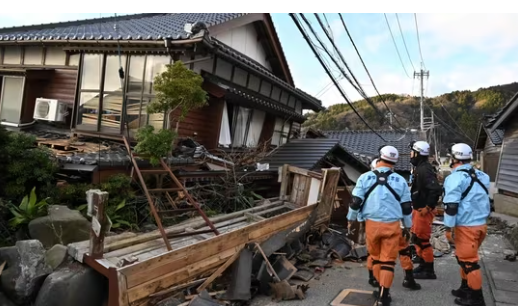A powerful earthquake that struck Japan, the death toll has climbed to 62, leaving the nation grappling with the aftermath of widespread destruction. Search and rescue teams are facing formidable challenges, contending with aftershocks and adverse weather conditions as they race against time to locate survivors.
The earthquake, registering a magnitude of 7.2, struck the northeastern part of Japan, triggering a series of aftershocks that have hindered rescue efforts. The affected regions, including Miyagi and Fukushima, are now the focal points of a massive operation involving emergency services, military personnel, and volunteers.
Rescuers on the ground are battling not only against the structural damage caused by the initial quake but also the ongoing threat of aftershocks, making the task of finding and extracting survivors a precarious one. The aftershocks have not only complicated rescue operations but have also heightened anxiety among the affected population, who remain on edge.
Compounding the challenges faced by the rescue teams is the adverse weather conditions. Heavy rain and snowfall have hampered access to some of the more remote and isolated areas, making it difficult for rescuers to reach those in need. Helicopters, a crucial asset in such operations, have been grounded at times due to poor visibility and dangerous flying conditions.
The government has mobilized significant resources to aid in the relief efforts, deploying the Self-Defense Forces and urging citizens to assist in any way possible. Evacuation centers have been set up to provide shelter and essential supplies for those displaced by the disaster.
International assistance is also being coordinated, with neighboring countries and global relief organizations offering support in terms of manpower, equipment, and financial aid.
Prime Minister Yoshihide Suga addressed the nation, expressing condolences to the families of the victims and assuring citizens that every effort is being made to speed up the rescue and recovery operations. He emphasized the importance of unity and resilience in the face of this natural disaster.
As the nation mourns the lives lost and grapples with the ongoing crisis, the collective spirit of the Japanese people remains unbroken. The coming days will be crucial as rescue teams push forward in the race against time, battling both the forces of nature and the relentless ticking of the clock.








 India
India












